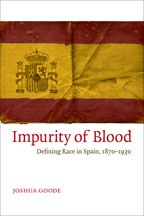New Book by Goode ’91 Focuses on Racial Theories in Spain

In Impurity of Blood: Defining Race in Spain, 1870–1930 (LSU Press), Joshua Goode ’91 traces the development of racial theories in Spain from 1870 to 1930 and explores the Spanish proposition that racial mixture, rather than racial purity, was the bulwark of national strength.
He begins his study with a history of ethnic thought in Spain in the medieval and early modern era, and then details the formation of racial thought in Spain’s nascent human sciences. He examines the political, social and cultural manifestations of racial thought at the dawn of the Franco regime and, finally, discusses its ramifications in Francoist Spain and post–World War II Europe.
Goode analyzes the findings of Spanish racial theorists working to forge a Spanish racial identity in the late 19th and early 20th centuries, when race and racial sciences were most in vogue across Europe. The goal of Spanish social sciences was to trace the history of racial fusion, studying both the separate elements of the Spanish composition and the factors that had nurtured them. Ultimately, Goode finds that national identity based on mixture—the inclusion rather than the exclusion of different peoples—did not preclude the establishment of finely wrought and politically charged racial hierarchies.
His book should prove useful to scholars of Spanish and European history, racial theory, historical anthropology and the history of science.
Goode teaches history and cultural studies at Claremont Graduate University in California.

